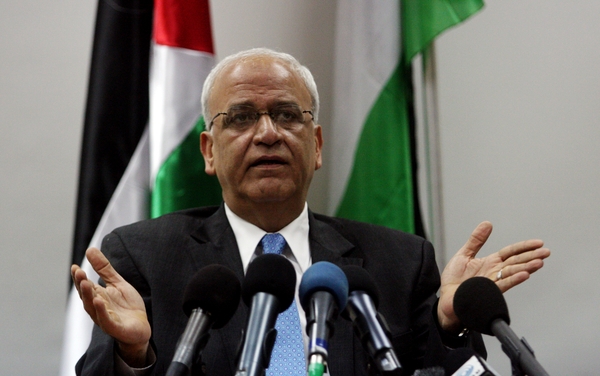His rightwing, religious coalition marks a new shift to the right by giving increased prominence to Naftali Bennett's nationalist-religious Jewish Home party, which strongly backs settlement activity.
The move looks likely to complicate Israel's damaged relationship with the Palestinians and further strain ties with the international community.
US President Barack Obama, who has had a testy relationship with Netanyahu, said in a statement that he "looks forward to working" with the new government.
But with a majority of only 61 of the Knesset's 120 seats, the coalition looked set to face an uphill battle for survival, and commentators said Netanyahu would seek to broaden it out in the coming months.
Analysts said there was not likely to be any immediate change in Israel's policy towards the Palestinians, while Bennett would likely strengthen the settlement drive.
As the new government took shape, Israel gave the green light for construction of another 900 new homes in Ramat Shlomo, a settlement neighbourhood in east Jerusalem, the Peace Now watchdog said.
- Denounced by Palestinians -
The Palestinians denounced the new government, with chief negotiator Saeb Erakat saying it was clear it would not be working for peace and would seek to expand settlements.
This coalition "will be one of war which will be against peace and stability in our region," he said.
"This government will set its sights on killing and reinforcing settlement activities," he said of Israeli construction on land the Palestinians want for a future state.
Senior Palestinian official Hanan Ashrawi said Jewish Home "represents the most extreme and racist elements within Israeli society".
The new government could "wreak havoc in the region," she warned.
But Jonathan Rynhold, a political analyst from the Begin-Sadat Centre, cautioned against jumping to conclusions, saying the cabinet lineup could change "very quickly" in the coming months.
"Assuming that the government starts off narrow and rightwing, the international position of Israel will obviously become more difficult," he said.
Under the terms of the agreement, Bennett and his party will take several key portfolios including justice and education, as well as control of the World Zionist Organisation's settlement division, which transfers money to settlements.
The party will have two seats in the security cabinet and the position of deputy defence minister, with responsibility for the Civil Administration that runs civilian affairs in most of the occupied West Bank.
Robbie Sabel, an expert at Jerusalem's Hebrew University, said the new government would not be popular with the international community but noted that Netanyahu would be careful to keep foreign policy matters out of Bennett's hands.
"Intentionally, Netanyahu is keeping the foreign ministry in his own hands for the meantime which means there will be no change in Israel's foreign policy," he said.
- Netanyahu 'bought time' -
Sabel said Washington would likely express its concerns privately while judging Netanyahu on the basis of his actions.
"In the past he has restrained the extreme rightwing, he has restrained settlement building."
Experts agreed that were Netanyahu to secure a deal to bring in Isaac Herzog's Zionist Union in the coming months, it would change the picture on the international front.
But Herzog said he would not be swayed.
"We won't be a fifth wheel and we do not intend to save Netanyahu from the hole he has dug for himself," he told reporters.
"If he thinks he can wave one portfolio or another (to convince me otherwise) he is making a bitter mistake."
With such a slim majority, Netanyahu was likely to be already seeking ways of expanding his fragile administration, which is to be sworn at the Knesset on Monday, commentators said.
"To a great extent, Netanyahu didn't succeed in forming a government, but has bought time to form a different government," one political observer told the left-leaning Haaretz daily.
Likud sources were quoted in several papers as saying they would seek to expand the coalition over the next few months by including Zionist Union or even Avigdor Lieberman's Yisrael Beitenu.
Lieberman earlier this week pulled out of coalition talks in a move which ultimately cast Bennett into the role of kingmaker.
Netanyahu did not speak of expanding his coalition.
On Thursday he said the new government's "biggest challenge is Iran's attempt to arm with nuclear weapons, while developing terror fronts and occupations throughout the Middle East."
"Not only we are threatened but also other nations in the region," he said.
------------------------------------------------------------------------------------
The move looks likely to complicate Israel's damaged relationship with the Palestinians and further strain ties with the international community.
US President Barack Obama, who has had a testy relationship with Netanyahu, said in a statement that he "looks forward to working" with the new government.
But with a majority of only 61 of the Knesset's 120 seats, the coalition looked set to face an uphill battle for survival, and commentators said Netanyahu would seek to broaden it out in the coming months.
Analysts said there was not likely to be any immediate change in Israel's policy towards the Palestinians, while Bennett would likely strengthen the settlement drive.
As the new government took shape, Israel gave the green light for construction of another 900 new homes in Ramat Shlomo, a settlement neighbourhood in east Jerusalem, the Peace Now watchdog said.
- Denounced by Palestinians -
The Palestinians denounced the new government, with chief negotiator Saeb Erakat saying it was clear it would not be working for peace and would seek to expand settlements.
This coalition "will be one of war which will be against peace and stability in our region," he said.
"This government will set its sights on killing and reinforcing settlement activities," he said of Israeli construction on land the Palestinians want for a future state.
Senior Palestinian official Hanan Ashrawi said Jewish Home "represents the most extreme and racist elements within Israeli society".
The new government could "wreak havoc in the region," she warned.
But Jonathan Rynhold, a political analyst from the Begin-Sadat Centre, cautioned against jumping to conclusions, saying the cabinet lineup could change "very quickly" in the coming months.
"Assuming that the government starts off narrow and rightwing, the international position of Israel will obviously become more difficult," he said.
Under the terms of the agreement, Bennett and his party will take several key portfolios including justice and education, as well as control of the World Zionist Organisation's settlement division, which transfers money to settlements.
The party will have two seats in the security cabinet and the position of deputy defence minister, with responsibility for the Civil Administration that runs civilian affairs in most of the occupied West Bank.
Robbie Sabel, an expert at Jerusalem's Hebrew University, said the new government would not be popular with the international community but noted that Netanyahu would be careful to keep foreign policy matters out of Bennett's hands.
"Intentionally, Netanyahu is keeping the foreign ministry in his own hands for the meantime which means there will be no change in Israel's foreign policy," he said.
- Netanyahu 'bought time' -
Sabel said Washington would likely express its concerns privately while judging Netanyahu on the basis of his actions.
"In the past he has restrained the extreme rightwing, he has restrained settlement building."
Experts agreed that were Netanyahu to secure a deal to bring in Isaac Herzog's Zionist Union in the coming months, it would change the picture on the international front.
But Herzog said he would not be swayed.
"We won't be a fifth wheel and we do not intend to save Netanyahu from the hole he has dug for himself," he told reporters.
"If he thinks he can wave one portfolio or another (to convince me otherwise) he is making a bitter mistake."
With such a slim majority, Netanyahu was likely to be already seeking ways of expanding his fragile administration, which is to be sworn at the Knesset on Monday, commentators said.
"To a great extent, Netanyahu didn't succeed in forming a government, but has bought time to form a different government," one political observer told the left-leaning Haaretz daily.
Likud sources were quoted in several papers as saying they would seek to expand the coalition over the next few months by including Zionist Union or even Avigdor Lieberman's Yisrael Beitenu.
Lieberman earlier this week pulled out of coalition talks in a move which ultimately cast Bennett into the role of kingmaker.
Netanyahu did not speak of expanding his coalition.
On Thursday he said the new government's "biggest challenge is Iran's attempt to arm with nuclear weapons, while developing terror fronts and occupations throughout the Middle East."
"Not only we are threatened but also other nations in the region," he said.
------------------------------------------------------------------------------------









 Home
Home Politics
Politics











